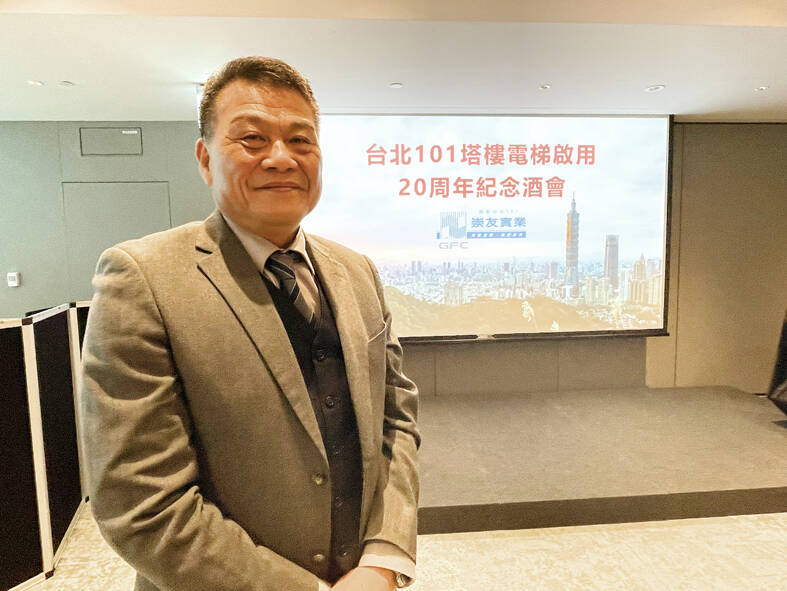Elevator manufacturer Golden Friends Corp (崇友實業) reported a 30 percent year-on-year increase in net profit for the third quarter to NT$322 million (US$10.34 million), driven by steady shipments of new elevators and resilient replacement demand.
Revenue from new installations accounted for 47.85 percent of overall sales in the quarter, while replacement projects contributed 11.33 percent, highlighting its balanced business model, the Taipei-based company said.
Smooth shipments and replacement demand supported consistent growth in operations and revenue, Golden Friends said.

Photo: CNA
Moreover, long-term investment in maintenance services has improved earnings quality, it said.
A comprehensive service framework, a well-trained technical team and a digitalized dispatch system enable the firm to respond promptly to customer needs, improve service efficiency and sustain high renewal rates, it said.
That explains why recurring income from maintenance and service has remained a key profitability driver, it said.
Gross margins improved to 31.32 percent, attributed to a diversified product mix across residential, healthcare and commercial segments, Golden Friends said.
The company also credited tighter procurement discipline, optimized component sourcing, more efficient inventory management and cost-structure adjustments for margin gains.
It expects demand from urban renewal projects, renovations at aging buildings and industrial zone development to continue to support growth in new installations and replacements, it said.
With a healthy backlog of new orders, Golden Friends plans to deepen supply-chain integration, streamline engineering processes and enhance labor flexibility to ensure smooth execution, it said.
In the first three quarters of this year, net profit grew 19.74 percent to NT$895 million, or earnings per share (EPS) of NT$5.06, a record for the nine-month period.
In contrast, housing agency Hiyes International Co (海悅國際開發) faced significant headwinds, reporting a 70.8 percent decline in net profit in the first three quarters to NT$596 million, or EPS of NT$3.61.
Hiyes International said that the drop was due to a weak presale housing market, with few new project launches in the third quarter, and limited room to adjust prices on existing developments.
Despite mild easing in September, mortgage terms remain restrictive, which is keeping the real-estate brokerage sector in a seasonal lull, it said.
Hiyes International booked NT$200 million in non-operating losses due to tariff pressures, housing policy challenges and higher financing costs, it said.
Tax expenses further reduced income by NT$300 million, it said.
The company said that it would continue to leverage its nationwide brokerage network and targeted sales strategies to capture demand across Taiwan’s real-estate market, ensuring a steady flow of agency projects.
Revenue momentum is expected to be stable this quarter, underpinned by contributions from key property projects near high-speed rail stations in Miaoli County and Taichung, it said.
It would closely monitor the central bank’s credit policies and the availability of mortgage resources for buyers with real demand — key factors that could revive market activity, it added.

Japanese technology giant Softbank Group Corp said Tuesday it has sold its stake in Nvidia Corp, raising US$5.8 billion to pour into other investments. It also reported its profit nearly tripled in the first half of this fiscal year from a year earlier. Tokyo-based Softbank said it sold the stake in Silicon Vally-based Nvidia last month, a move that reflects its shift in focus to OpenAI, owner of the artificial intelligence (AI) chatbot ChatGPT. Softbank reported its profit in the April-to-September period soared to about 2.5 trillion yen (about US$13 billion). Its sales for the six month period rose 7.7 percent year-on-year

CRESTING WAVE: Companies are still buying in, but the shivers in the market could be the first signs that the AI wave has peaked and the collapse is upon the world Taiwan Semiconductor Manufacturing Co (TSMC, 台積電) yesterday reported a new monthly record of NT$367.47 billion (US$11.85 billion) in consolidated sales for last month thanks to global demand for artificial intelligence (AI) applications. Last month’s figure represented 16.9 percent annual growth, the slowest pace since February last year. On a monthly basis, sales rose 11 percent. Cumulative sales in the first 10 months of the year grew 33.8 percent year-on-year to NT$3.13 trillion, a record for the same period in the company’s history. However, the slowing growth in monthly sales last month highlights uncertainty over the sustainability of the AI boom even as

AI BOOST: Next year, the cloud and networking product business is expected to remain a key revenue pillar for the company, Hon Hai chairman Young Liu said Manufacturing giant Hon Hai Precision Industry Co (鴻海精密) yesterday posted its best third-quarter profit in the company’s history, backed by strong demand for artificial intelligence (AI) servers. Net profit expanded 17 percent annually to NT$57.67 billion (US$1.86 billion) from NT$44.36 billion, the company said. On a quarterly basis, net profit soared 30 percent from NT$44.36 billion, it said. Hon Hai, which is Apple Inc’s primary iPhone assembler and makes servers powered by Nvidia Corp’s AI accelerators, said earnings per share expanded to NT$4.15 from NT$3.55 a year earlier and NT$3.19 in the second quarter. Gross margin improved to 6.35 percent,

FAULTs BELOW: Asia is particularly susceptible to anything unfortunate happening to the AI industry, with tech companies hugely responsible for its market strength The sudden slump in Asia’s technology shares last week has jolted investors, serving as a stark reminder that the world-beating rally in artificial intelligence (AI) and semiconductor stocks might be nearing a short-term crest. The region’s sharpest decline since April — triggered by a tech-led sell-off on Wall Street — has refocused attention on cracks beneath the surface: the rally’s narrow breadth, heavy reliance on retail traders, and growing uncertainty around the timing of US Federal Reserve interest-rate cuts. Last week’s “sell-off is a reminder that Asia’s market structure is just more vulnerable,” Saxo Markets chief investment strategist Charu Chanana said in